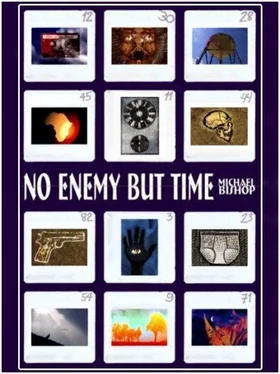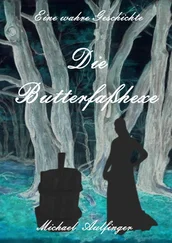She watched me. How, two million and six years after our first meeting, to describe her? Well, even as my forefinger fumbled for my automatic’s trigger, I noticed that she had uncanny self-reliance and poise.
The fact that she was carrying a hefty club in one fist underscored this observation, but did not occasion it. She appeared to be about four inches shy of five feet tall and too lithe of build to throw her weight around effectively—a diminutive, sinewy Black Beauty. Her beauty was to me
Like those Nicean barks of yore
That gently, o’er a perfumed sea,
The weary, way-worn wanderer bore
To his own native shore…
This poem crossed my mind, I think, because Babington had recited it repeatedly during our last two or three weeks together in the Lolitabu National Park. From the first, then, I called the creature who had awakened me in the prehistoric woods Helen—not so much after the Helen of Homeric legend as after the enduring passion of an old Wanderobo warrior who had once been married to a woman by that name. This distinction is important, for although I recognized the individuality of Helen Habiline’s beauty almost from the outset, I saw it in an African rather than a Western European context.
She appeared to be clad in the creation of a horny furrier. A girdle of fur covered her lower abdomen and loins, but her breasts and upper thighs were so lightly haired that the ebony smoothness of her flesh shone through. The hair on her head was hyacinth, wiry, and flyaway, almost as if she had grabbed an uncombed fright wig from a department store mannequin—but her eyes sparkled like ripe black olives and her nose was fierce and generous. Her everted upper lip curled backward over a set of prodigious uppers, teeth like unpainted casino dice. In brief, her face and figure commanded my attention, focused my admiration and awe.
The heat of the day and the suety animal smell of Helen told me that I was not dreaming. There was precedent for what was happening to us, too, for I recalled that on the only occasion that Lemuel Gulliver permits himself to go skinny-dipping in the land of the Houyhnhnms, a female Yahoo throws herself lustfully into the water after him. Although Helen was less brash than that libidinous Yahoo and I more modestly attired than the startled Gulliver, our meeting otherwise seemed to parallel that of our fictional counterparts.
Helen scrutinized my clothes with intent interest—from the red bandanna about my neck to the rubber-soled chukkas encasing my feet. When she cocked her head to one side, I had the unnerving impression that, with an effort of superhabiline concentration, she was mentally disrobing me. What kind of body did I have under the strategically arrayed skins cloaking my back and loins? Although she had never met a fop before, Helen clearly understood that my togs were accessories rather than outlandish extensions of my person. She tried to see through them to me.
I took off my bandanna and held it out to her. “Here. If you want it, it’s yours.”
Her eyes widened at the sound of my voice, but she did not accept the bandanna, merely studied the way it dangled between my fingers. Then she retreated another step or two.
“Joshua Kampa at your service. I’ve come in peace for all mankind. Womankind, too, as far as that goes.”
At this point Helen raised her club, showed me her enviably powerful teeth, and erected the short hairs on her shoulders and upper arms. This response nonplused and frightened me. I gestured placatingly with the bandanna, but she pivoted, glanced at me over one muscular shoulder, and, imparting a pretty swivel to her steatopygic fanny, stalked eastward through the undergrowth. A ridge of dark fur ran down her spine to the small of her back, but there was only enough hair about her anus to defend her when she sat upon the ground.
* * *
Helen was indisputably a member of the hominid species for which I had once invented the black-hand-with-eye symbol for use in my dream diary. A representative, in other words, of the species that paleoanthropologists call either Australopithecus habilis or Homo habilis . Alistair Patrick Blair preferred the former term because he had pinned his hopes of winning the earliest-near-human-ever-discovered sweepstakes to the coccyx of a dubious creature called Homo zarakalensis . To my mind, though, Helen had to be considered human, and the term I preferred then—and still prefer today—is Homo habilis .
The specimens of A. robustus who had fled from me earlier were mere apes by comparison to Helen.
The fact that she had come out exploring on her own also told me something about her character: i.e., that she possessed a degree of independence typical of many well-adjusted, adult human beings. She did not mind taking acceptable risks; she did not mind acting, upon occasion, entirely on her own. A baboon, an australopithecine, or even a chimp would never have ventured so far afield without at least one confederate nearby for moral support.
Looked at in another light, however, Helen’s independence argued against her categorization as an advanced hominid. Our immediate ancestors, Blair had taught me, were gregarious creatures, craving companionship and the approval of their peers. A loner among such buddy-buddy primates would have been an aberration, for her people would have lived in a social unit where the ethos of a loner could contribute only uncertainty and disruption. This chain of reasoning led me to conclude that Helen was indeed an aberration among her kind, but probably in a positive rather than a pejorative way. Judged against the standard of her fellow habilines, she was more, rather than less, human. She had her eye on the angels.
Why was she out alone? Two possible reasons presented themselves. First, maybe she had got fed up with the demands of habiline togetherness and retreated to the woods to commune with her—dare I propose it?—soul. Second, maybe she had struck off by herself on a mission meant to benefit her entire group, in which case she would have been a patriot rather than a misanthrope, and hence an aberration with a certain grimy social cachet. If this second hypothesis proved out, why, Helen and I had something significant in common.
I struck off in the direction she had gone.
* * *
Within a mile I came to a clearing in the gallery forest, where woods and savannah abutted each other on the slope of a hill. Between two fingers of forest, at the point of a V-shaped web of grass, a modest hominid culture flourished. To my astonishment, on my first day I had found a bona fide habiline “village.”
Three crude dwellings—with stone bases, curved sapling supports, and haphazard thatchings of brush—occupied this little nook, and I gaped at them like a man who has stumbled upon a McDonald’s at the summit of a remote Himalayan mountain. None of these structures would keep out a heavy rain or deflect a howling wind, but they were clearly capable of providing shade during the day and a sense of womblike security at night.
Damn my broken transcordion. Here was confirmation that the habilines had built shelters similar to those of contemporary hunter-gatherers in the Kalahari and elsewhere, but I could not report the finding.
I named this village Helensburgh.
Having arrived just ahead of me, Helen hooted to announce her return, and through the holes in the haystack huts I saw dark bodies responding to her oddly musical call. Several females and children spilled out into the V-shaped clearing from the huts, while others appeared from the edges of the woods.
Because of my impeded view at the edge of the gallery forest and the habilines’ incessant movement, I could only estimate the number of creatures that turned out to welcome, or waylay, their prodigal Amazon. Fourteen or fifteen, it seemed to me. Helen had status among these people. What kind of status, however, I could not yet say.
Читать дальше



![Ally Carter - [Gallagher Girls 01] I'd Tell You I Love You But Then I'd Have to Kill You](/books/262179/ally-carter-gallagher-girls-01-i-d-tell-you-i-lo-thumb.webp)








